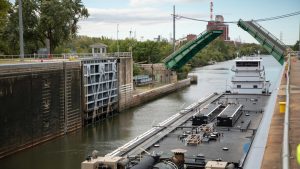Barge traffic back to normal; lock closures loom
By Daniel Grant FarmWeek — February 3, 2023
A tow enters the lock chamber moving upstream at Brandon Road Lock and Dam in Joliet. The U.S. Army Corps of Engineers plans to close four locks on the upper Illinois River at Starved Rock, Marseilles, Dresden Island and Brandon Road for rehabilitation work from June 1 through Sept. 30. (Photo by Army Corps Rock Island District)
Barge traffic is getting back to normal on the lower Mississippi River for what’s typically a slower time of the year anyway.
“The water levels are back up to normal south of Cairo versus where it was in September and October,” Tom Torretti, of Consolidated Grain & Barge Co., told FarmWeek at the Illinois Fertilizer and Chemical Association’s (IFCA) annual convention in Peoria in mid-January. “The low water issue last year was the worst we’d seen since 1988.”
The low water issues, which Toretti said made parts of the mighty river temporarily look like a creek, snarled barge traffic and caused freight rates to skyrocket in 2022.
Fortunately, barges are moving again and freight rates are coming down as the planting season approaches. Much of the fertilizer and other input products used on Illinois farms arrive in the state via barge.
“After harvest, things slow down and then start picking up around February as shippers move fertilizer up the river system,” Torretti said. “Bulk rate contracts out of New Orleans are 15 to 20 percent higher than a year ago. All our costs are up. But what southbound grain freight values do remains to be seen. They’re back to normal for now.”
When asked if farmers will have access to adequate supplies of inputs moved on the river this spring, Torretti said, “I think so (based on current conditions and barring spring flooding).
“The fertilizer industry is so good at what it does, buyers always get their products,” he continued. “Just, maybe not when they want it.”
The barge industry added 226 new covered hopper barges to the fleet last year from previous orders, which will help increase the flow of products on the river system.
But, with the current cost of a new covered hopper barge between $900,000 and $1 million, the existing fleet of around 11,800 barges likely won’t grow much more any time soon.
“Until steel prices come down, we probably won’t see many new builds,” Torretti said.
Meanwhile, the barge industry faces more shipping issues this spring and summer – this time of the planned variety.
The U.S. Army Corps of Engineers plans to close three locks on the Upper Illinois River at Marseilles, Dresden Island and Brandon Road for rehabilitation work from June 1 through Sept. 30. The planned closure for work at the Starved Rock lock has been deferred to a later date, yet to be determined.
“There’ll be no traffic at all. You’ll have to plan accordingly,” Torretti told attendees of the IFCA convention. “We’ve known about this for two years and been through this before. It is what it is.”
The Corps previously closed five locks on the Illinois River at LaGrange, Peoria, Starved Rock, Marseilles and Dresden Island from July 1 to Oct. 29, 2020, for major rehab and maintenance work.
“The timing of the repairs (this year) is after spring planting and before harvest, so it’s probably the best time to do it,” Torretti said. “But, when the locks do reopen, it will be a mad dash on all commodities. We potentially could be harvesting grain and will certainly be moving fertilizer to put down for the fall season.”
This story was distributed through a cooperative project between Illinois Farm Bureau and the Illinois Press Association. For more food and farming news, visit FarmWeekNow.com.
Ad 1 – 300×250 – Google ROS
Trending News
 Three men shot – one ...Three men were shot – one fatally -- Saturday afternoon on Chicago's ...
Three men shot – one ...Three men were shot – one fatally -- Saturday afternoon on Chicago's ... Government, defense spar as child ...With the criminal trial of Elburn veterinarian Adam Stafford King fast approaching ...
Government, defense spar as child ...With the criminal trial of Elburn veterinarian Adam Stafford King fast approaching ... Chicago teen charged in fatal ...A 19-year-old Chicago man has been charged in connection with a fatal ...
Chicago teen charged in fatal ...A 19-year-old Chicago man has been charged in connection with a fatal ... Challenges persist for women, minorities ...PEORIA — For 60 years, SkillsUSA Illinois has held workforce development competitions ...
Challenges persist for women, minorities ...PEORIA — For 60 years, SkillsUSA Illinois has held workforce development competitions ...
Ad 3 – 300×600 – Post Pages – Google ROS
Ad 2 – 300×250 – Google ROS



